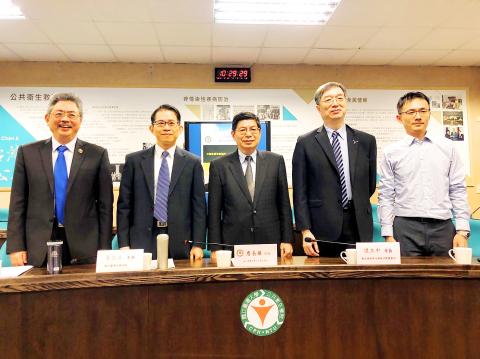Children conceived by older fathers are more likely to develop early-onset schizophrenia, and every 10 years on a father’s age increases the probability of the condition in their children by 30 percent, researchers said on Friday.
Although congenital disorders have previously been linked to the age of the mother, few studies have focused on the relationship between paternal age and children’s health, said Chen Wei-jen (陳為堅), a professor of public health at National Taiwan University.
After examining the family history of about 2,900 people with schizophrenia, Chen’s team determined that advanced paternal age could be correlated to early-onset schizophrenia, defined as developing the condition before 18, he said.

Photo: Wu Liang-yi, Taipei Times
The team conducted a genomic analysis on about 1,700 people and their families, which indicated that each decade of paternal aging after 20 increases the child’s risk of early-onset schizophrenia by a factor of 1.28, he said.
There are two hypotheses that could explain the correlation: one is that the quality of sperm — which is created by cell division through the entire life of males — tends to decline with multiplying genetic mutations, resulting in congenital disorders among offspring; the second is that the phenomenon is caused by other characteristics, such as a pre-existing history of mental illness, the team said.
About 66 percent of children conceived by men aged 50 or older will develop some kind of early-onset mental illness, said Wang Shi-heng (王世亨), an associate professor of occupational safety and health at China Medical University.
The ideal age to father children is 25 to 29, when the sperm is fully developed and relatively free of mutations, he said.
Ministry of the Interior data from 2017 showed that the average age for Taiwanese men to have their first child was 34.5, up from 30.3 in 1991.

The manufacture of the remaining 28 M1A2T Abrams tanks Taiwan purchased from the US has recently been completed, and they are expected to be delivered within the next one to two months, a source said yesterday. The Ministry of National Defense is arranging cargo ships to transport the tanks to Taiwan as soon as possible, said the source, who is familiar with the matter. The estimated arrival time ranges from late this month to early next month, the source said. The 28 Abrams tanks make up the third and final batch of a total of 108 tanks, valued at about NT$40.5 billion

A group from the Taiwanese Designers in Australia association yesterday represented Taiwan at the Midsumma Pride March in Melbourne. The march, held in the St. Kilda suburb, is the city’s largest LGBTQIA+ parade and the flagship event of the annual Midsumma Festival. It attracted more than 45,000 spectators who supported the 400 groups and 10,000 marchers that participated this year, the association said. Taiwanese Designers said they organized a team to march for Taiwan this year, joining politicians, government agencies, professionals and community organizations in showing support for LGBTQIA+ people and diverse communities. As the first country in Asia to legalize same-sex

Travel agencies in Taiwan are working to secure alternative flights for travelers bound for New Zealand for the Lunar New Year holiday, as Air New Zealand workers are set to strike next week. The airline said that it has confirmed that the planned industrial action by its international wide-body cabin crew would go ahead on Thursday and Friday next week. While the Auckland-based carrier pledged to take reasonable measures to mitigate the impact of the workers’ strike, an Air New Zealand flight arriving at Taipei from Auckland on Thursday and another flight departing from Taipei for Auckland on Saturday would have to

MOTIVES QUESTIONED The PLA considers Xi’s policies toward Taiwan to be driven by personal considerations rather than military assessment, the Epoch Times reports Chinese President Xi Jinping’s (習近平) latest purge of the Chinese People’s Liberation Army (PLA) leadership might have been prompted by the military’s opposition to plans of invading Taiwan, the Epoch Times said. The Chinese military opposes waging war against Taiwan by a large consensus, putting it at odds with Xi’s vision, the Falun Gong-affiliated daily said in a report on Thursday, citing anonymous sources with insight into the PLA’s inner workings. The opposition is not the opinion of a few generals, but a widely shared view among the PLA cadre, the Epoch Times cited them as saying. “Chinese forces know full well that